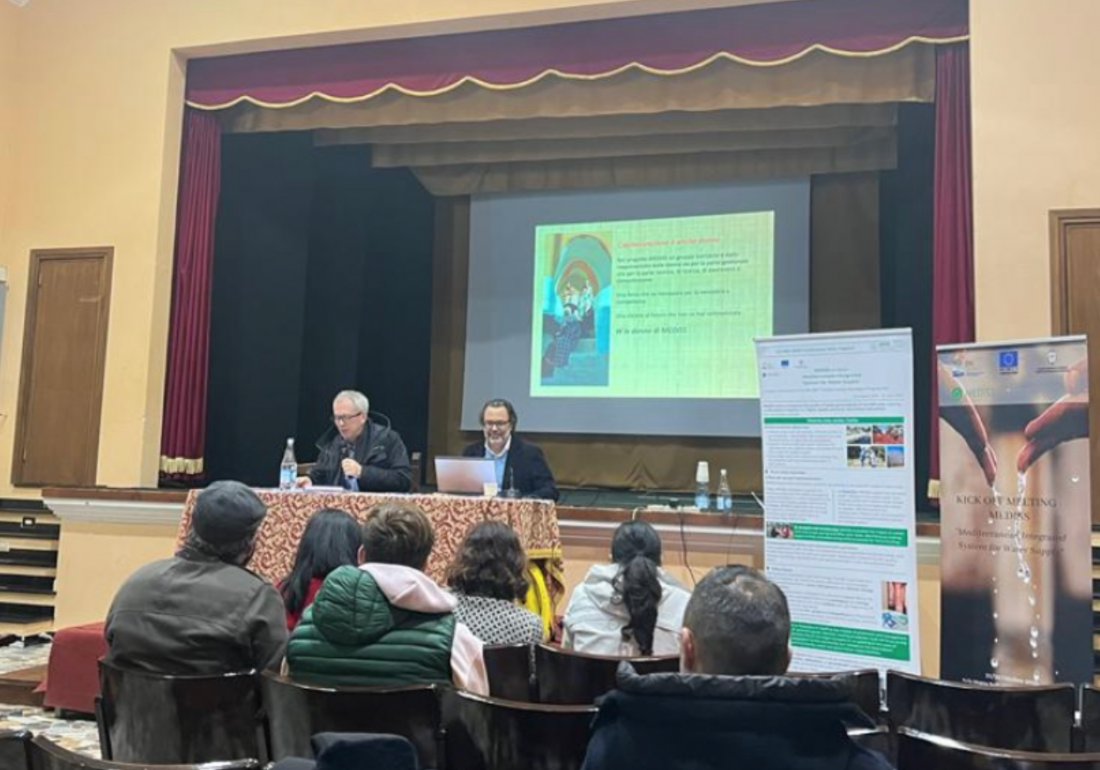Sardinia: MENAWARA and MEDISS projects contribute to improving the quality of water and soil in the highly polluted area of Arborea

MENAWARA project leaders and collaborators convened in Arborea, South Sardinia, on February 23rd, to participate in the final MEDISS event, “Mediterranean Integrated System for water Supply”, where the important results achieved during the three-year experimentation process have been presented.
During the event, the added value of a diversified, collaborative approach in tackling the effects of water scarcity and of the contamination of water and soil across the southern Mediterranean region have been highlighted.
In recent years, the region has been facing severe challenges related to water scarcity mainly caused by prolonged droughts and a decrease in rainfall: the groundwater sources have been depleted causing a shortage of water for agricultural use. In Arborea in particular, the situation has been made worse by the groundwater contamination due to high nitrate concentrations.
Nitrates are a natural component of the soil and are necessary for plant growth, however, excessive levels of nitrates can be harmful, leading to a range of health problems in humans and animals. As the intensive farming, milk, and meat production are prevalent in the area, the high levels of nitrate in the soil are mainly due to the excessive spread of organic effluents used as fertilizers occured in the past which caused the contamination of groundwater. Since the Nitrate Vulnerable Zone was established, these practices have been severely restricted in application of the Nitrates Directive.
For the past three years, both MENAWARA and MEDISS have worked in synergy to contrast and mitigate the effects of contamination.
MENAWARA and MEDISS are twin projects: we share the area of intervention and its challenges. The path to take is to identify options for mitigation, but acting only on the sources is not enough. We have to capitalise on the the mix of solutions and synergies to face the problem from different angles, so that they could be replicated in other areas both in the Arborea plain and in other areas of the island or the Mediterranean region..
Representatives from local and international institutions and organisations including ENAS, the University of Cagliari, CRENoS, NRD University of Sassari, the Palestinian Wastewater Engineers Group, TIMESIS, ADIS, AGRIS, ARPAS, LAORE, Fondazione MEDSEA, Livegreen, Province of Oristano and Municipality of Arborea, took part in the public debate.
MEDISS works within an area of approximately 20 irrigated hectares and developed a pilot plant for ammonia stripping, through innovative membranes, from liquid component of livestock manure from the Arborea Producers Cooperative plant, testing the use of the fertilizer produced (ammonium sulphate) in the same pilot area through an experimental path of soil and groundwater monitoring. Specifically, the contribution that could result in terms of reducing the load of nitrates for the district of Arborea, can constitute a significant pilot experience for the other areas experiencing comparable problems.
Actions capitalize on existing technologies by introducing elements or methods innovative (mixing, tertiary treatments and stripping for treated waste water, durable membrane and energy photovoltaic for reverse osmosis desalination), while the networking measures, cross-border documentation and communication promote capacity building institutions, scaling effects and transferability of results.
As NRD's Pier Paolo Roggero pointed out
Three years is a short horizon to measure the impact of innovation. MEDISS and MENAWARA however have opened a window to transform the perception of waste (water) into a resource. That is why it is crucial to encourage continuity across projects to foster opportunities for innovation and proliferation of virtuous practices. Such projects are the tiles of a wide transnational mosaic of successful development and cooperation initiatives integrating local competences and advanced technologies. Scientific cooperation at regional level has the potential to generate sustainable growth in the Mediterranean, with a tangible political impact.
In conclusion, the problem of nitrate contamination in the area of Arborea is a severe challenge that requires urgent attention. To address the issue, there is a need for sustainable mitigation solutions, through which the region can safeguard its natural resources and promote sustainable economic growth.
MENAWARA continues to work on raising awareness in local communities for the efficient use of water resources and soil.







